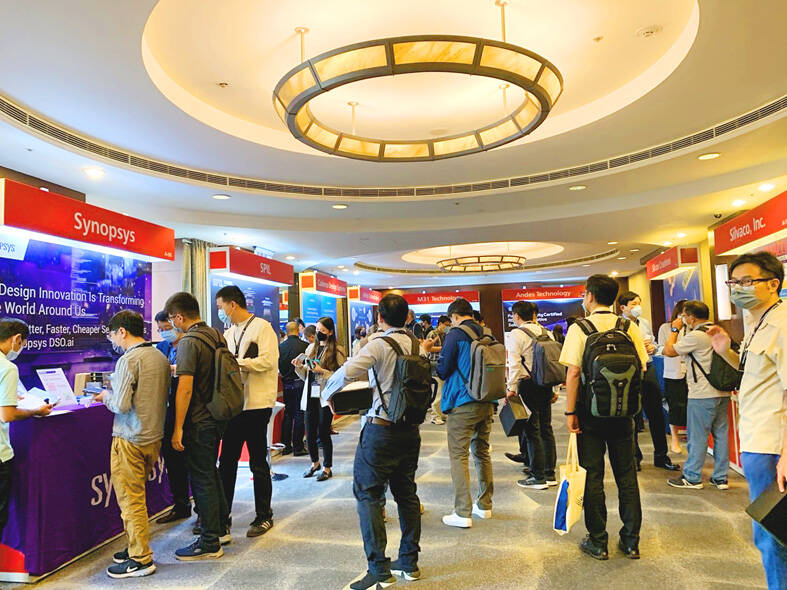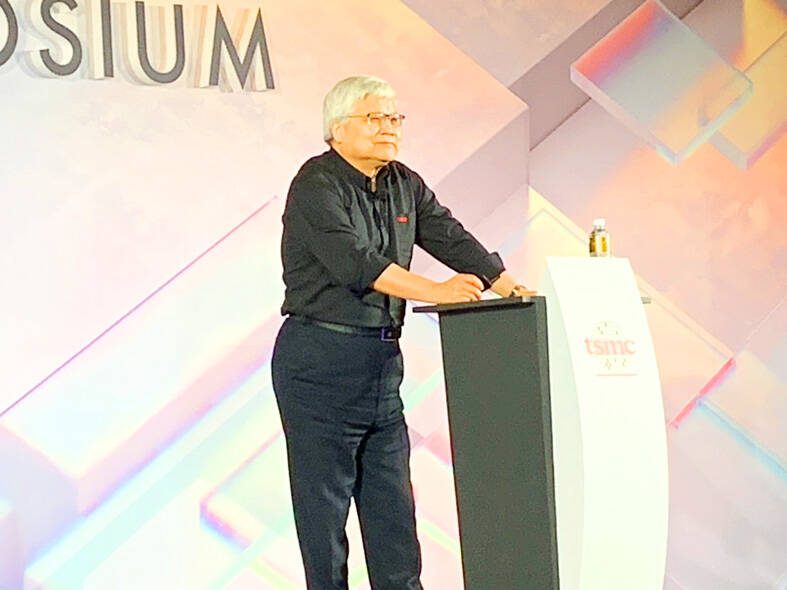Taiwan Semiconductor Manufacturing Co (TSMC, 台積電) yesterday said that three new plants in Kaohsiung, Japan and the US would start production in 2024, as it accelerates its capacity expansion to cope with growing semiconductor demand.
Apart from the two fabs that are under construction in Arizona and in Kumamoto, Japan, the world’s biggest contract chipmaker plans to start building a new fab in Kaohsiung in the second half of this year, TSMC vice president Y.L. Wang (王英郎) said at the firm’s annual technology symposium in Hsinchu.
The Kaohsiung fab, dubbed Fab 22, would produce 7-nanometer and 28-nanometer chips once it begins operations in 2024, Wang said.

Photo: Grace Hung, Taipei Times
The Arizona fab is to make 5-nanometer chips and the Kumamoto fab is to produce chips using specialty process technologies, he said.
To satisfy customer demand, TSMC is not only increasing leading-edge technology capacity, but also mature-node technologies, Wang said.
TSMC expects its advanced technology capacity to expand at a compound annual growth rate of 70 percent from 2018 to this year, thanks to robust demand for chips used in smartphones and high-performance computing devices such as servers, Wang said.

.Photo: Grace Hung, Taipei Times
This year alone, the company’s 5-nanometer chip capacity would more than quadruple from two years earlier, he said.
On top of that, TSMC plans to produce 3-nanometer chips in the second half of this year, Wang said, adding that 3-nanometer capacity is expected to increase rapidly at its Tainan fabs to cope with customer demand.
Because of substantial customer demand for 3-nanometer chips, the company’s engineering capacity is tight, TSMC chief executive officer C.C. Wei (魏哲家) said at the symposium.
The chipmaker plans to produce next-generation 2-nanometer chips at new factories in Hsinchu, Wang said.
TSMC is also stepping up its efforts to expand specialty technology capacity to meet rising demand for image sensors and radio frequency chips, Wang said.
Capital investment for specialty technologies would grow about 4.5-fold compared with the average outlay over the past three years, he said.
That would boost the capacity contribution from specialty technologies to about 63 percent of total wafer capacity this year, compared with 45 percent in 2018, he said.
The chipmaker has been expanding capacity faster in the past few years with an average of six factories built each year from 2018 to this year, compared with two factories from 2017 to 2019, Wang said.
However, TSMC said that chip manufacturing costs are rising rapidly, as China, Japan, the EU and the US are pushing to localize chip manufacturing to boost the resilience of their chip supply amid geopolitical tensions.
It is going to be costly if manufacturers reverse the globalization that has created economic benefits, Wei said.
In addition, TSMC has been making chips using specialty technologies at existing factories without the burden of depreciation and amortization costs, he said.
To make enough specialty technology chips to meet rising demand for vehicle chips and other applications, TSMC is building new factories, but would charge more for the chips due to depreciation and amortization costs, as well as the high cost of equipment tools, he said.

GROWING OWINGS: While Luxembourg and China swapped the top three spots, the US continued to be the largest exposure for Taiwan for the 41st consecutive quarter The US remained the largest debtor nation to Taiwan’s banking sector for the 41st consecutive quarter at the end of September, after local banks’ exposure to the US market rose more than 2 percent from three months earlier, the central bank said. Exposure to the US increased to US$198.896 billion, up US$4.026 billion, or 2.07 percent, from US$194.87 billion in the previous quarter, data released by the central bank showed on Friday. Of the increase, about US$1.4 billion came from banks’ investments in securitized products and interbank loans in the US, while another US$2.6 billion stemmed from trust assets, including mutual funds,

Micron Memory Taiwan Co (台灣美光), a subsidiary of US memorychip maker Micron Technology Inc, has been granted a NT$4.7 billion (US$149.5 million) subsidy under the Ministry of Economic Affairs A+ Corporate Innovation and R&D Enhancement program, the ministry said yesterday. The US memorychip maker’s program aims to back the development of high-performance and high-bandwidth memory chips with a total budget of NT$11.75 billion, the ministry said. Aside from the government funding, Micron is to inject the remaining investment of NT$7.06 billion as the company applied to participate the government’s Global Innovation Partnership Program to deepen technology cooperation, a ministry official told the

AI TALENT: No financial details were released about the deal, in which top Groq executives, including its CEO, would join Nvidia to help advance the technology Nvidia Corp has agreed to a licensing deal with artificial intelligence (AI) start-up Groq, furthering its investments in companies connected to the AI boom and gaining the right to add a new type of technology to its products. The world’s largest publicly traded company has paid for the right to use Groq’s technology and is to integrate its chip design into future products. Some of the start-up’s executives are leaving to join Nvidia to help with that effort, the companies said. Groq would continue as an independent company with a new chief executive, it said on Wednesday in a post on its Web

Taiwan Semiconductor Manufacturing Co (TSMC, 台積電), the world’s leading advanced chipmaker, officially began volume production of its 2-nanometer chips in the fourth quarter of this year, according to a recent update on the company’s Web site. The low-key announcement confirms that TSMC, the go-to chipmaker for artificial intelligence (AI) hardware providers Nvidia Corp and iPhone maker Apple Inc, met its original roadmap for the next-generation technology. Production is currently centered at Fab 22 in Kaohsiung, utilizing the company’s first-generation nanosheet transistor technology. The new architecture achieves “full-node strides in performance and power consumption,” TSMC said. The company described the 2nm process as